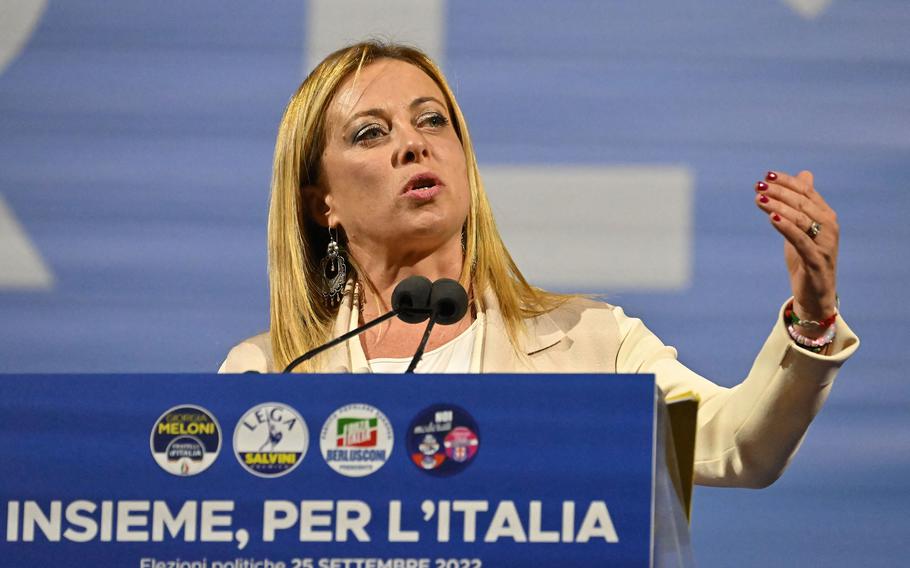
Brothers of Italy party leader Giorgia Meloni, now prime minister, gestures as she delivers a speech on stage on Thursday, Sept. 22, 2022, during a joint rally of Italy's right-wing parties Brothers of Italy (Fratelli d'Italia, FdI), the League (Lega) and Forza Italia at Piazza del Popolo in Rome, ahead of the Sept. 25 general election. (Alberto Pizzoli/AFP/Getty Images/TNS)
(Tribune News Service) — Prime Minister Giorgia Meloni is getting dragged into the escalating tensions between Washington and Beijing as she tries to disentangle Italy from its close relationship with China.
Meloni, the right-wing leader who came to power less than a year ago, is leaning toward pulling out of an agreement to join China’s controversial Belt and Road Initiative, which has funded $900 billion in infrastructure projects globally, according to people familiar with the government’s thinking. Italian officials raised the prospect of withdrawal in talks with Taiwan this week, Bloomberg reported.
Italy’s hawkish turn complicates Chinese President Xi Jinping’s effort to drive a wedge between European countries eager to retain economic relations with Beijing, and the U.S., which is implementing increasingly confrontational policies. This puts Italy and the European Union in a delicate position between the two superpowers.
“Italy is stuck between a rock and a hard place, and what to do with the cooperation pact is a real diplomatic conundrum for Meloni,” Francesca Ghiretti, an analyst at the Mercator Institute for China Studies research company, said in an interview. “Renewing it would send a very difficult message to Washington, but not renewing it would put a strain in relations with China.”
With U.S.-China relations deteriorating, Beijing is looking to prevent Europe from following Washington, particularly on measures like export controls of key technologies. The EU is struggling to balance a desire to engage with China on trade and investment with resisting economic coercion.
Underscoring the EU’s difficulties, a push by French President Emmanuel Macron to recruit China’s help for possible talks between Russia and Ukraine drew criticism from some allies who think such an effort is premature and fear it could undermine European unity.
Italy’s dilemma on Belt and Road is starting to draw the U.S. government’s attention, said the people who spoke on the condition of anonymity. For Washington and other capitals, it’s a sign of Meloni’s capacity to turn her staunch pro-U.S. rhetoric into facts.
In a speech in Washington on Thursday, Treasury Secretary Janet Yellen said the Biden administration was prepared to accept economic costs as it sought to protect U.S. national security interests from threats posed by China.
Italy is the only Group of Seven country that signed up to the infrastructure plan. The deal agreed in 2019 under then-Premier Giuseppe Conte has not led to deeper integration between Italy and China compared to other EU nations. But the stakes in quitting are economic and diplomatic, with the risk of Chinese retaliation.
China and Taiwan are key trading partners with Italy, which is the third largest importer of goods from China in the EU, and the fourth largest exporter of goods to the country which is a key export destination for luxury brands that are crucial for its industry.
Taiwan has planned to invest about $400 million in Italy’s chip industry, according to the Taipei Representative Office in Rome. On Friday, Industry Minister Adolfo Urso confirmed a Bloomberg report that his officials discussed plans to increase cooperation on semiconductors in private talks in Taipei. Urso said the mission was mostly technical, a sign that Italy is trying to keep the economic and diplomatic tracks as separate as possible.
“On semiconductors, Italy has some strategic advantages compared to other EU countries, manufacturing capacity and research and developments,” Vincent Tsai, head of Taipei’s office in Rome, said in an interview.
Tsai, who was appointed in the role earlier this year, said that bilateral trade between the two countries rose by 13% last year, and there are plans to further boost it with the opening of a new representative office later this year in Milan, Italy’s business capital.
Meloni wanted to have an announcement on Italy’s stance on Belt and Road by May’s G-7 summit, but picking an option is proving harder than expected for her coalition, the people said. The administration is split, with Meloni’s Brothers of Italy party mostly favoring ditching the pact, and others pushing to keep it.
In another delay, Meloni has yet to officially respond to an invitation to Beijing from Xi, which had been tentatively scheduled for May, according to the people. The trip is on hold as Italy studies ways to simply not renew the Belt and Road deal, while limiting the effect on China ties.
“At the moment, it seems the government is leaning toward not renewing the pact, but in this scenario it will be key to coordinate with the U.S. and other allies to react to a possible response,” Ghiretti said.
Alessandro Speciale and Thomas Hall contributed to this report.
___
©2023 Bloomberg L.P.
Visit bloomberg.com.
Distributed by Tribune Content Agency, LLC.